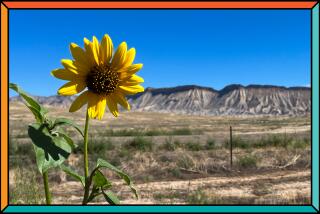In Tucson, the hypocrisy footprint
- Share via
I call it the swimming pool at the end of time. Roots were chopped, earth scraped, white pipes snaked like the insides of a rocket ship, rebar netted down before the concrete was poured and the tap turned on, filling the pool — which is in my backyard — with water from mountain snowmelt via the Colorado River, the Central Arizona Project and fossil water from the local aquifer.
If there’s one thing a nature writer shouldn’t do, it’s fill a big hole with water in the arid Southwest.
When Kathe suggested a pool for our tiny backyard, I hesitated. Even my stepmother, not exactly famous for her environmental views, objected. It would be a waste of the most precious resource in Arizona, akin to installing a snow maker in Dubai.
I considered voicing objections, but Kathe — who for years has missed the lakes of her Wisconsin childhood — really wanted a pool. And once into my first Tucson summer, which featured occasional stealthy swims at the pool of the nearby Arizona Inn, I reconsidered. The heat was astonishing, and the water — well, the water felt good.
It helped when I remembered that another nature writer in town had a whopping big pool in her patch of desert. She said something like: “People back East are so critical of pools here. But they’re a necessity, like trees in Vermont.”
Then I found out that a university scientist I work with also has a pool. She told me, a few weeks after she met with the Dalai Lama to talk about global warming, that when the desert weather gets really toasty, she floats in her pool, looks at the stars and meditates.
Private pools are mostly a new thing under the American sun, part of the post-World War II boom of suburban leisure, though perhaps the oldest known bathing pool dates from Bronze Age Pakistan. People in the desert love pools. They cool off the body and connect some to a sense of the sacred. The cult of the American backyard pool is, to historian Thomas A.P. van Leeuwen, less divinely inspired. He calls it “hydro-vulgarity.”
With an estimated 10 million pools in the United States, this vulgarity is big business. And many of those pools are in the arid West. Another historian, Evan Ward, speaks of modern “mirage culture” in the American West, consisting of the nonnative lawn, golf courses, fountains, artificial lakes and swimming pools.
We bought our Tucson house from a native-plants landscape designer, so it is ringed with barrel cactus and desert marigold. No grass. We don’t play golf, have no plans for Las Vegas-style fountains and wouldn’t build an artificial lake — other than our pool. Ever ready to privately grouse about homeowners with lawns, Kathe and I have given in to one aspect of mirage culture. How soon before you catch us watching Esther Williams on Netflix?
A 2007 Arizona Republic article puts the water cost of a pool in perspective: “Because of evaporation losses, a pool in the desert has to be virtually refilled every year, wasting enough potable water to supply an average household for a month or more.” And that doesn’t touch the electrical and chemical costs of filtration or the carbon footprint of building the thing.
We talk of wind farms and bio-regionalism, smart grids and phenology, sulfur aerosols and extreme weather, microbes per acre and, yes, carbon footprints. Let’s talk about a hypocrisy footprint. What would that look like? Would it look like a hole in the ground with pumps and electrical lines in tubes? Like a liberal politician with two homes across one continent? A global warming activist who racks up frequent flier miles like a touring rock star?
Humans are almost infinitely flexible in how we adapt and justify. It’s one of the things that makes us so capable of dealing with changing circumstances. Without these traits, our species would be long gone.
It also means we indulge in hypocrisy. Thing is, we who try to do right by the world often do wrong by it, and consciously so. We juggle the personal calculus — carbon footprint on this side of the column, hypocrisy footprint on the other — and make the choices we do, choices we often can’t defend.
Guilt is a fine force for altering behavior, but only to a point. Doing your best means having done worse. The swimming pool will be a catalyst for some local eco-volunteering and maybe for a household gray-water system. (But Tucson wastewater helps recharge the city’s Santa Cruz River.) Would it help if I flush less? (We don’t much already.) Up my offsets? I ride my bike to work now. Am I justified? What would Wendell Berry say?
Maybe I’ll invite the literati over for a swim and see what they think. We’ll talk about the end of the world, of the Holocene, drink bottles of organic pinot noir, laugh and, in conclusion, get up the next morning and do whatever it is we think we ought, or whatever it is, in fact, that we do.
Christopher Cokinos is the author, most recently, of “Bodies, of the Holocene.” A longer version of this essay appeared in the journal Whole Terrain. He teaches at the University of Arizona.
More to Read
A cure for the common opinion
Get thought-provoking perspectives with our weekly newsletter.
You may occasionally receive promotional content from the Los Angeles Times.










